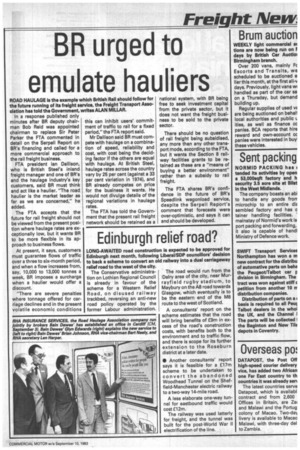BR urged to emulate hauliers
Page 15

If you've noticed an error in this article please click here to report it so we can fix it.
ROAD HAULAGE Is the example which British Rail should follow for the future running of its freight service, the Freight Transport Association has told the Government, writes ALAN MILLAR.
In a response published only minutes after BR deputy chairman Bob Reid was appointed chairman to replace Sir Peter Parker the FTA commented in detail on the Serpell Report on BR's financing and called for a more commercial approach to the rail freight business.
FTA president Ian Dallison, who is British Steel's inland freight manager and one of BR's and the haulage industry's key customers, said BR must think and act like a haulier. "The road haulier is the market leader as far as we are concerned," he added.
The FTA accepts that the future for rail freight should not be viewed from the present position where haulage rates are exceptionally low, but it wants BR to be more flexible in its approach to business flows.
At present, it says, customers must guarantee flows of traffic over a three to six-month period, and when a flow increases from, say, 10,000 to 13,000 tonnes a week, BR imposes a surcharge when a haulier would offer a discount.
"There are severe penalties where tonnage offered for carriage declines and in the present volatile economic conditions this can inhibit users' commitment of traffic to rail for a fixed period," the FTA report said.
Mr Dallison said BR must compete with haulage on a combination of speed, reliability and cost, with cost being the deciding factor if the others are equal with haulage. At British Steel, haulage rates across the country vary by 25 per cent (against a 33 per cent variation in 1974), and BR already competes on price for the business it wants. He would not divulge details of the regional variations in haulage rates.
The FTA has told the Government that the present rail freight network should be retained as a national system, with BR being free to seek investment capital from the private sector, but it does not want the freight business to be sold to the private sector.
There should be no question of rail freight being subsidised, any more than any other transport mode, according to the FTA, but it wants the Section 8 railway facilities grants to be retained as these are a "means of buying a better environment" rather than a subsidy to rail freight.
The FTA shares BR's confidence in the future of BR's Speedlink wagonload service, despite the Serpell Report's comment that forecasts were over-optimistic, and says it can and should be developed.




























































































































